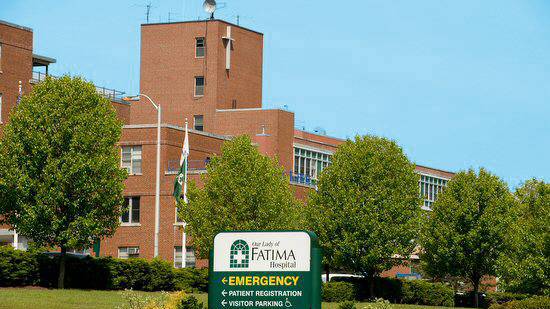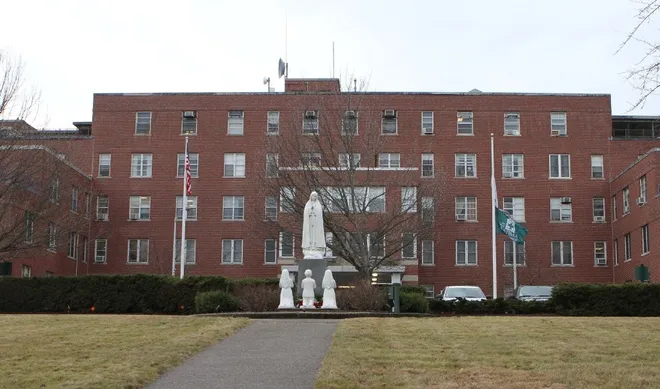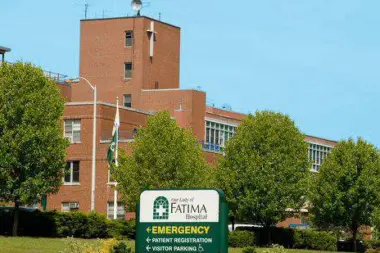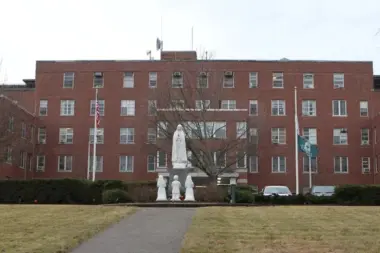I was admitted to the unit at a terrible time in my life and needed some help. If it wasn’t for the care I received, I may not be here today to tell you how caring and thorough the providers and staff were.
About Our Lady of Fatima Hospital
Their comprehensive behavioral health program offers help with mental healing as well as other benefits such as addiction treatment to put you on the road to recovery. They provide behavioral health emergency and crisis intervention care services, which are available 24/7. One nice thing about being admitted here is that often behavioral health problems are accompanied by other health issues, and medical care is available immediately if needed.
They have an inpatient behavioral health treatment program that is for acute psychiatric needs and geriatric psychiatry services. They also have an outpatient program for people who don’t need 24 hour care. It’s a short term intensive treatment program that’s customized to fit each person’s specific needs.
The outpatient program has a sector for those with mental health issues and substance use disorder or what’s called dual diagnosis. Aside from the individual outpatient care they also have family and group therapy sessions.
Latest Reviews
Rehab Score
Gallery




Other Forms of Payment
Private insurance refers to any kind of healthcare coverage that isn't from the state or federal government. This includes individual and family plans offered by an employer or purchased from the Insurance Marketplace. Every plan will have different requirements and out of pocket costs so be sure to get the full details before you start treatment.
Self-pay involves paying for treatment out of your own pocket. You can use savings or credit, get a personal loan, or receive help from family and friends to fund your treatment. If you don't have insurance or your insurance plan doesn't cover a specific program, self-pay can help ensure you still get the care you need.
Financial aid can take many forms. Centers may have grants or scholarships available to clients who meet eligibility requirements. Programs that receive SAMHSA grants may have financial aid available for those who need treatment as well. Grants and scholarships can help you pai for treatment without having to repay.
Sliding scale payments are based on a client's income and family size. The goal is to make treatment affordable to everyone. By taking these factors into account, addiction recovery care providers help ensure that your treatment does not become a financial burden to you or your family, eliminating one barrier to care.
Medicare is a federal program that provides health insurance for those 65 and older. It also serves people under 65 with chronic and disabling health challenges. To use Medicare for addiction treatment you need to find a program that accepts Medicare and is in network with your plan. Out of pocket costs and preauthorization requirements vary, so always check with your provider.
Medicaid is a state based program that helps lower-income individuals and families pay for healthcare. Medicaid covers addiction treatment so those enrolled can use their coverage to pay for rehab. When a program accepts Medicaid the client often pays very little or nothing out of their own pocket.
Military members, veterans, and eligible dependents have access to specific insurance programs that help them get the care they need. TRICARE and VA insurance can help you access low cost or no cost addiction and mental health treatment. Programs that accept military insurance often have targeted treatment focused on the unique challenges military members, veterans, and their families face.
Addiction Treatments
Levels of Care
Clients who are stepping down from inpatient care and those who prefer to remain at home during treatment may choose to enroll in an outpatient rehab. These facilities offer a comprehensive continuum of care designed to evolve with clients' changing needs. Partial hospitalization (PHP) and intensive outpatient (IOP) programs are designed for clients requiring frequent and high intensity treatment. Clients in outpatient care typically engage in individual, group, and family counseling and recovery-focused life skills training.
Clients in inpatient rehab benefit from a highly structured and supportive environment away from the stressors that can trigger or exacerbate addiction. Inpatient treatment is designed primarily for clients in early recovery or at an increased risk of relapse. They provide intensive clinical supervision and addiction counseling, which may include group and family therapy. Clients may also engage in extensive addiction education to support long-term sobriety. Many programs offer complementary therapies, including art and animal therapy.
Rehab aftercare programs provide a complete continuum of care for clients who have successfully completed higher level treatment programs but who may still be enrolled in formal outpatient treatments. These programs are also designed for clients who have been discharged from outpatient care. Drug rehab aftercare facilitates clients' long-term sobriety through a full suite of customized services aligned with the client's evolving needs. These services may include peer coaching, career counseling, and 12 step program induction, among others.
12 step programs may be found both in addiction treatment centers and in the community, where meetings are anonymous, free, and open to the public. These programs presume that sustained recovery depends on spiritual, psychological, and emotional growth and healing. Religious affiliation isn't required, but the 12 step recovery model is based on the belief in a higher power. Peer sponsors support participants as they use the steps to cultivate self-awareness, forgiveness, acceptance, and accountability.
A drug intervention in Rhode Island can provide the support and encouragement an individual needs to take a first step toward recovery. This planned meeting is facilitated by an interventionist and includes the individual and their loved ones. The goal is to encourage the individual to get the help they need. The interventionist offers intervention services that include planning, guidance, and treatment recommendations.
A partial hospitalization program (PHP) offers intensive rehab without the need for 24-hour care. Whether it's an alternative to inpatient hospitalization or a step-down option post-hospital or residential care, PHP treatment often includes relapse prevention strategies, medication management, and other behavioral therapy interventions. PHP treatment typically requires daily sessions for 4-8 hours, 5 days a week. Depending on your progress, the length of PHP treatment can vary, averaging 90 days. The cost of PHP treatment varies but is often fully or partially covered by providers.
In medically assisted detox, a team of medical professionals will be on hand 24/7 as your body is detoxing from addictive substances. As a result, you may experience physical and psychological side effects, such as mood swings, anxiety, nausea, or flu-like symptoms to help alleviate potential withdrawal symptoms, and keep you as safe and comfortable throughout this process.
Treatments
Many of those suffering from addiction also suffer from mental or emotional illnesses like schizophrenia, bipolar disorder, depression, or anxiety disorders. Rehab and other substance abuse facilities treating those with a dual diagnosis or co-occurring disorder administer psychiatric treatment to address the person's mental health issue in addition to drug and alcohol rehabilitation.
Mental health rehabs focus on helping individuals recover from mental illnesses like bipolar disorder, clinical depression, anxiety disorders, schizophrenia, and more. Mental health professionals at these facilities are trained to understand and treat mental health issues, both in individual and group settings.
Programs
Adult rehab programs include therapies tailored to each client's specific needs, goals, and recovery progress. They are tailored to the specific challenges adult clients may face, including family and work pressures and commitments. From inpatient and residential treatment to various levels of outpatient services, there are many options available. Some facilities also help adults work through co-occurring conditions, like anxiety, that can accompany addiction.
Young adulthood can be an exciting, yet difficult, time of transition. Individuals in their late teens to mid-20s face unique stressors related to school, jobs, families, and social circles, which can lead to a rise in substance use. Rehab centers with dedicated young adult programs will include activities and amenities that cater to this age group, with an emphasis on specialized counseling, peer socialization, and ongoing aftercare.
Recovery is most successful when clients feel accepted and validated by their peers and treatment providers. Facilities that offer LGBTQ-inclusive programming are committed to creating a safe space where everyone can grow and recover without fear of judgment or discrimination. They will have dedicated policies in place to create a safe and supportive environment that fosters free expression.
Serving in the military is both mentally and physically challenging, and can result in trauma that persists even after combat ends. Military programs are tailored to the specific and often complex needs of active duty personnel, veterans, and military families. Clients often access these programs through the U.S. Department of Veterans Affairs (VA).
Clinical Services
During cognitive behavioral therapy in Rhode Island, your therapist helps you identify negative thought patterns and explore healthier ways to think and act. You'll learn how to develop coping strategies and change your behaviors.
The word dialectical means opposing. Dialectical behavior therapy focuses on two opposites: acceptance and change. You'll learn to accept your emotions and circumstances while also working to make changes. You'll identify negative patterns and learn coping skills to create new, healthy patterns.
Group therapy is any therapeutic work that happens in a group (not one-on-one). There are a number of different group therapy modalities, including support groups, experiential therapy, psycho-education, and more. Group therapy involves treatment as well as processing interaction between group members.
Individual therapy for drug addiction is a collaborative process between yourself and your therapist. During your sessions, you address personnel experiences and emotional struggles head on. This helps your therapist gain insight into your addiction triggers and develop coping skills and a road map for sustained recovery.
Trauma focus therapy helps you heal from the psychological impact that trauma has had on your life. Using this approach promotes healing, helps you to better understand your emotional and physical responses, and fosters emotional resilience.
Couples who are in couples therapy meet with a licensed counselor weekly. The therapist mediates while each partner voices their concerns. The couple then receives feedback and insights on how to work through the challenges they're facing in the relationship.
During family therapy sessions, each member has a safe space to openly express their feelings about addiction and the challenges it has created within the family. It is crucial to rebuild trust, strength, and relationships that were affected by addiction. This helps the family to support and empower their loved one's recovery.
Nutrition therapy, aka medical nutrition therapy (MNT), is a way of treating physical, emotional, and medical conditions through diet. Specific dietary plans are designed by professional nutritionists or registered dietitians, and patients follow them in order to positively affect their physical and mental health.
Amenities
-
Private Transportation
-
Residential Setting
-
Private Rooms
Staff
Jeffrey H. Liebman
CEO
David J. Ragosta
CFO
Donna Rubinate, RN, MBA
COO
R. Otis Brown
VP, Marketing & External Affairs
Cherry Krys, MBA, CHC
VP, Compliance & Research
Lynn Leahey, RN
VP of Patient Care Services & Chief Nursing Officer
Contact Information
200 High Service Avenue
North Providence, RI 02904